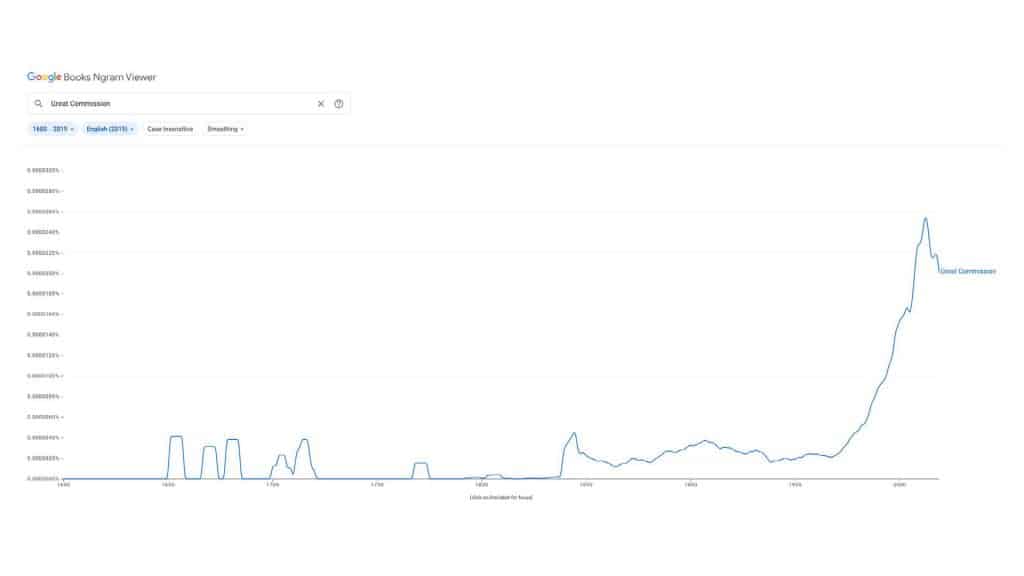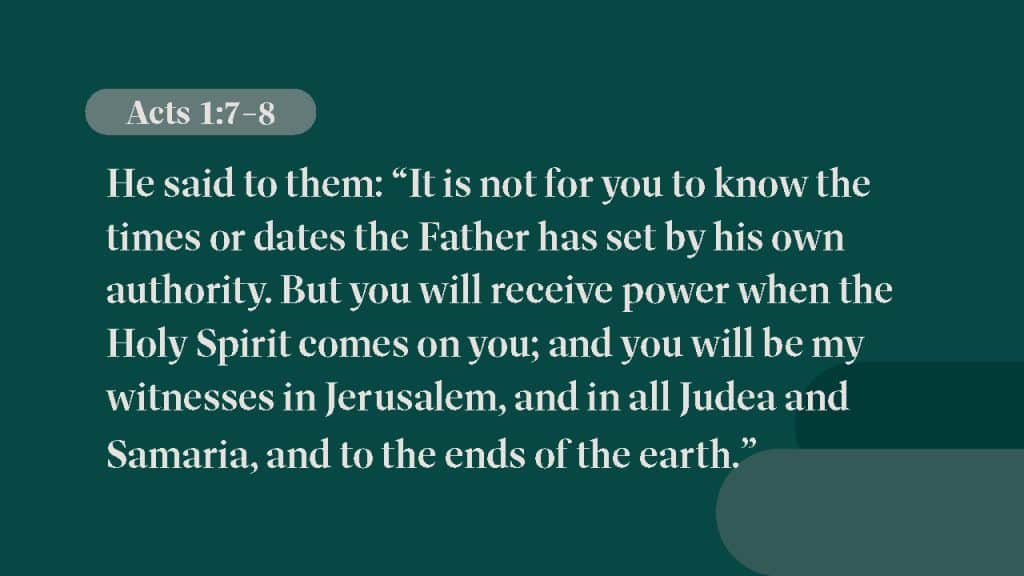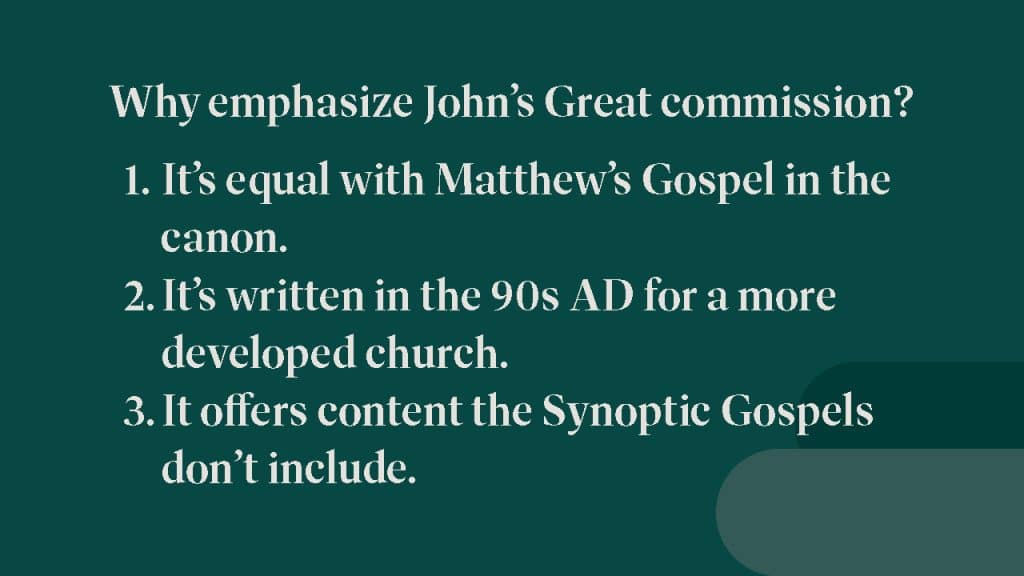The “Great Commission” of John’s Gospel offers much needed direction for the church today in order to make her effective at evangelism.
Listen to the original audio recording via the player above. Also available on Spotify, Google, and Apple.
I‘ve been enamored with the intersection of church and mission since I went on a year-long mission on the island of Cyprus. Fifteen years ago, I was twenty years old and the border between the north and the south of this Mediterranean island had just been opened where it was possible for US citizens to gain easy access to share the gospel in Cyprus once again.
And as I sought to reach the Islamic students and people of the Turkish Republic of Northern Cyprus in 2006, I kept being confronted with this question: What are we winning them to?
It used to be among many Christian traditions that we would send missionaries as the Lone Ranger or the Lone Ranger family onto foreign mission fields. But the church in the last few decades has witnessed the perils of that method, and we’ve started to send missionary groups and families with other families to the betterment of mission—and missionaries.
In fact, I know of a group of my friends and others from Ozark Christian college who went to Japan. There were about ten missionaries I knew that all went together through Mustard Seed Global Fellowship to this vastly unreached people group, which currently only has 1% of the population being Christians. And when they went there, people told them it’s likely that it will be seven years before they see one single convert. It’s been 12 years now and they just had a staff retreat of 100 in Japan, most of whom are nationals.
God can do whatever he wants, whenever he wants, with or without our permission.
The “Great Commission” is Good and Vital!
The Great Commission is super valid. I would say the Great Commission is not only valid but also good and vital.
My publishing company, HIM Publications, publishes discipleship resources because we care about the Great Commission. And in fact, I come from a family who cares about the Great Commission. My dad runs discipleship.org, which is devoted to fueling disciple-making organizations and disciple makers around the country and around the world. We hold a National Disciple Making Forum every year. My dad also runs renew.org, which is fueling discipleship through theology.
So I have embraced a legacy that says disciple-making and evangelism are good. The Great Commission is vital.
We must make disciples of Jesus by going to them baptizing them and teaching them obedience. I want us to emphasize the Great Commission. I am a huge advocate of it, but:
We must apply the Great Commission correctly.
The phrase “Great Commission” is not in the Gospel of Matthew. Furthermore, it’s not called that by the early church.
However, scholars have noted that we don’t find this phrase before 1664 in Justinian Von Welz’s book, Migration and Religion. The second occurrence of in literature that we can find is actually 200 years later, when Hudson Taylor used the phrase “Great Commission” with regard to Matthew 28 to justify the China inland mission.
Notice that at this point, it’s used to talk more about evangelism than disciple-making. So from the beginning of its use in the English language, writers have used this phrase to emphasize something that is not the core of what Matthew 28:18–20 is about. And when you look at the data, the “Great Commission” has grown in popularity exponentially only in the last 50 years.
Google Ngram Viewer will let you see the occurrences of the phrase “Great Commission” in English History. You see a little blip on the radar in the mid-1600s, then 200 years later, you see a little bit more. Then, it is sort of baseline until you hit about the 1970, then boom: very popular phrase in literature.

So when we’re looking at the popularity of the Great Commission, it’s really a 50-year phenomenon. What I’m arguing for is that our emphasis on it is somewhat arbitrary, compared to what it could be. Also, I want to argue for turning up the volume on the endings of the other Gospels.
For example, why don’t we focus on the ending of Mark and Luke? Why do we pick Matthew?
The “Great Commission” in Mark
There are only two really doubtful passages in the Protestant canon of the Bible that were not original, and we’re pretty sure of that fact. We’ve got the story of the adulterer and Jesus from John 7:53–8:11 and the long ending of Mark (Mark 16:9–20).
The Gospel of Mark ends with some rather strange words as far as the manuscripts go because the earliest two manuscripts don’t have Mark 16:9-20. And the earliest church fathers also do not have it, like Clement of Alexandria, Origin, Eusebius, and Jerome. In fact, verses 9 to 20 don’t show up until Irenaeus and the Diatessaron in the mid-second century.
So if Mark 16:8 is the last of Mark’s Gospel, it’s rather odd that the very last word is “afraid.” Not quite encouraging, not quite Good News to me if you ask. Metzger says it’s most likely we just lost that last leaf of the autograph.
My friend and New Testament scholar Shane Wood says Mark ended this way on purpose to invite readers into the story and overcome their fear of the Jews. But I’m not there yet.
Maybe we’ll find the ending to Mark one day. But until then we should probably not emphasize Mark 16:8 because it ends with the word afraid. So I don’t recommend that we look to the Gospel of Mark to turn up the dial.
But what about Luke 24?
The “Great Commission” in Luke
The ending of Luke starts in verse Luke 24:45:
Then [Jesus] opened their minds so they could understand the Scriptures. He told them, “This is what is written: The Christ will suffer and rise from the dead on the third day, and repentance and forgiveness of sins will be preached in his name to all nations, beginning at Jerusalem. You are witnesses of these things. I am going to send you what my Father has promised; but stay in the city until you have been clothed with power from on high.”
In Acts 1:7–8, we get a little more texture for what Christ said right before he actually did this, and these are his last words before he ascended:

Power. That’s a little different than what we read in Matthew 28 isn’t it? That’s one important aspect of a disciple’s life that many see the Church in the West to be missing today.
So what I want to say is that we have a disproportionate focus on the Gospel of Matthew. Why not focus on other places in Scripture? And if you look at the actual last words of Jesus, it sounds like something that could help the church out these days.
Wait, be empowered, and then strategically go.
Maybe we should turn up the volume on Luke 24 because God did give us four Gospels for a reason.
So I’m not diminishing the Great Commission in Matthew. I’m saying yes, keep the volume high on that, but let’s raise the bar for all of the other Gospels so we can hear them all in surround sound.
And what about John? What are we missing if we leave the ending of John’s Gospel out? I think we’re missing John’s matrix of missions, which is tightly woven into his ecclesiology. I believe this, along with Luke’s emphasis on power, unlocks for the church true missional effectiveness.
John’s Great Commission
I believe the church today needs to balance things out with Jesus’ “Great Commission” in the Gospel of John 21:15–19, when Jesus commissioned Peter to shepherd his people. I believe this impetus, this commission, understood as a protype for church leaders’ approach to missions via the church, will make us more effective on God’s mission to make disciples of all nations.
Why emphasize shepherding in John 21?
1. First, John’s Gospel is equal with Matthew’s Gospel in canonical history, so there’s no reason to not emphasize it.
2. Second, John is written in the 90s, and the audience was a more developed church. It was probably written three decades after the other Gospels were written. It’s unique. I call it the BBC World News of the Gospels: John is out there and a little different, but really helpful and interesting.
3. Third, it also offers content that the Synoptic Gospels don’t include. John had the other Gospels at his disposal when he was writing his. Most of what’s in John is not in the other Gospels, and most of what’s in the other Gospels is not in John.
So why emphasize John’s “Great Commission”? It’s equal in authority. It’s slightly more relevant chronologically to our time. The church was more developed then. And it offers unique content.

I also want to say that John’s Gospel is not just history. In fact, it is an ancient bios, which is the genre category for the New Testament Gospels. If you compare the Gospels with other bios—other biographies of the first century—they were written not just for information but also for emulation.
They were written to give you a picture on the wall that you could hang up and say, “That’s who we want to be like.” That’s the kind of people we want to be like. Why were the Gospels written? Not just for individualistic discipleship, but for the church.
The Gospel of John is not just history; it’s written to breathe life into the church.
So we can reliably lean on Peter’s individual great commission for the life of the church in John 21. In other words, it’s not just sort of an anecdote, it’s not a tag on, it’s not a cute ending for the altar call at the end of the sermon. This is life and instruction for the health and vibrance of the church.
And remember that just previous to this story, in John 20, we get the purpose statement of John: “But these are written that you may believe that Jesus is the Christ, the Son of God, and that by believing you may have life in his name” (John 20:31).
The purpose of all the stories in John is to give life and “these things” at the beginning of v. 31 is with regard to miracles.
And then we find a miracle right after this statement, which is the miraculous catching of fish in John 21, which gives us the context for the story of John 21 where Peter is in fact commissioned by Christ and reinstated.
John 21 gives us what I want to call an impetus toward a biblical theology of a church-driven mission.
The Commission to Shepherd: The Story of John 21
John 21 is the moment of Peter’s reinstatement. Where he had once denied Christ three times in front of a coal fire, he is now reinstated three times in front of a coal fire—the only two times in the canon where we have the Greek word for “coal fire.”
There’s something important going on here. This is huge. This is not a tag on. And remember, Peter is the great apostle to the Gentiles. I’ve always been surprised that Paul wasn’t that guy. God picked the guy who struggles with Gentile inclusion to be the Apostle to the Gentiles. But I guess that makes sense in this crazy, upside-down kingdom.
Listen to what Jesus tells this great missionary…
You know how the story goes. Peter and his cronies had gone fishing all night because they got bored, and they caught nothing again. And then Jesus calls out from the shore, his identity unknown to them at the time:
“Friends. Haven’t you any fish?”
No.
Then Jesus tells them what to do, and they couldn’t haul in the net of fish because they caught so many from their obedience.
When they make it to shore, Jesus invites them to breakfast on the beach. Who knew he could make breakfast? A man of many talents.
And for some reason, John emphasizes how many fish there were: 153. Peter counts them. And then it’s confrontation station between Jesus and Peter.
In John 21:15 we read, “When they had finished eating, Jesus said to Simon Peter, ‘Simon son of John.’”
This is one of those moments where you’re talking with your father or your mother and they call you by your full name. You know that you’re in for a talking to.
Jesus said to Simon Peter, “Simon son of John, do you truly love me more than these?”
What are “these” in this context? I think it’s the fish, and in the recesses of Peter’s heart and mind was the original invitation to follow Jesus: I will make you a fisher of men.
“Do you love me more than your evangelistic ministry and your mission?”
“Yes, Lord,” he said, “you know that I love you.” Jesus said, “Feed my lambs.”
Again, Jesus said, “Simon son of John, do you truly love me?” He answered, “Yes, Lord, you know that I love you.” Jesus said, “Take care of my sheep.”
The third time he said to him, “Simon son of John, do you love me?” Peter was hurt because Jesus asked him the third time, “Do you love me?” He said, “Lord, you know all things; you know that I love you.” Jesus said, “Feed my sheep. (John 21:15–17)
You could hear a pin drop on that beach. Jesus said, do you love me? Feed my lambs. Take care of my sheep. Feed my sheep. And what was he saying? He was saying, “Care for the people of God.”

The Problem with Mission-Only Strategy
Don’t miss the church for the mission.
Just previous to this, in John 20:21, Jesus gave the Johannine missional commission: “Peace be with you! As the Father has sent me, I am sending you.” But what comes after that is Johannine ecclesiology.
In other words:
John’s Gospel doesn’t end with a call to go, this Gospel ends with a call to care.
I don’t think these are different calls. They’re both meant to resound and sound with equal volume.
The church today is losing ground because we’ve gotten things mixed up: I believe that in our seeker-sensitive, purpose-driven models of doing church, we have put missiology in front of ecclesiology.
We’ve put the mission in front of the church, and we’re suffering for it.
It’s like we’re going out to invite people to a party, but when they get there, the party is pretty lame. Why, then, are we confused that the back door of the church is wider than the front door? It’s because the party has music that doesn’t sound good, the food’s cold, and no one wants to be there.
Why are you inviting people to a church like that? Church should not be a lame party.
Another analogy that I use is that we’re like someone saying, “Come on in, we’ve got doctors in here, but they’re currently gushing from the neck bleeding because they’re wounded,”
No wonder people say to the church, “You’re crazy.”
Just to put it directly and explicitly, I think our churches are unhealthy.
Now, if you’ve got an auditorium full of baby Christians, it’s not going to be a vibrant, full, thriving church, and that there’s a place for that. I’m not saying it’s bad to ever be unhealthy. The church is where unhealthy people need to come. What I’m saying is this:
We need to get healthy, we need to become whole, we need to be healed, and we need to have a little fun.
We need to throw actual parties that people enjoy being at. We need to have meals where people feel like they’re dining with the King because we’ve been enculturated by the Holy Spirit, filled with generosity, and there’s an outpouring of love and grace and truth and patience and kindness and goodness that flows from our hearts.
Come on, people of God!
I want to argue and advocate for a church-driven mission, not a mission that tags on church at the end.
And so what I’m making an argument for is a method of mission that’s church-driven, where the healthy, whole, and vibrant church leads to mission success.
Again, it’s not either-or. I’m talking about the order of mission and church.
A Methodological Reordering
So here’s what this reordering looks like: When we become Christians, I’m calling that Christology. When we join the church and we become vibrant disciples together, I’m calling that ecclesiology. And when we go on mission together, I’m calling it missiology.
While it looks linear here, that’s only for the point of this argument. It is not always linear. In fact, it’s cyclical, it’s backwards, upside down, and all sorts of different orders. And that’s fine.
But as leaders, pastors, and ministers in our sphere, I think we need to think clearly about the order of how things should move. In other words, you don’t send a missionary out who doesn’t have the gospel down.
I’m trying to say we have put Christology, then missiology, and then ecclesiology in that order. I’m saying, let’s switch the order there. In other words, let’s be disciples before we make disciples.
Sounds pretty simple, doesn’t it?
But we’re so obsessed with “particles and progress” that we have neglected feeding the lambs. And that’s why I think we’re bleeding from the neck.
Let’s go ahead and get healed up. It’s all right to just rest a little bit.
What does this look like in the Gospels?
It looks like Matthew 15:24, where Jesus says, “I was sent only to the lost sheep of Israel.” What? That’s not true. You were sent for the whole world, Jesus. That shouldn’t be in the Gospels.
Well, there’s strategy and methodology. Yes, he was sent to the whole world for the whole world. But his specific mission was only the lost sheep of Israel, and he was very focused on it.
Why? Because of this principle of the people of God first before the mission; it’s embedded into the Gospels if you’re willing to see it.
And it’s not that he didn’t care about the nations. It’s this:
He knew that Israel was the key to unlocking the conversion of the nations.
He wasn’t scrapping Israel and saying, “Yeah, all you need is me.” He’s saying “I am the climactic ending or the climax of the story. I am the missing piece of Israel’s story.” By the way, the story is important, and so the very life and mission of Christ emphasizes the Christology and ecclesiology that I’m advocating for.
Then when you look in the Gospel of Luke, you see in Luke’s missiology that there’s an order to how missions should go.
Jerusalem is first, then Judea, Samaria, and then the ends of the earth. And when you map out the trajectory of Paul’s missions, it actually goes like that. If you’ve ever looked at it, it’s a centrifugal and outward-moving missiology.
All I’m advocating for is that we come back to Jerusalem for a minute, get home base settled, and then go back out to Judea and Samaria and the ends of the earth on a macro level.
The early church was strategic. We often think about Paul as a kind of rogue, like he’s just running through the nations, right? No, even Paul was strategic. He would follow up. When you look at the timing of when he wrote the letters, he would go to the missionary circuit, he’d write letters to follow up, do a bigger missionary circuit, and write letters to follow up.
Paul was nurturing the church.
By the way, what do you not hear in the Pauline epistles? Go evangelize. Have you ever noticed the emphasis of Paul’s letters? The great missionary was focused on a unified and mature church. Why? Because he knew that the secret to unlocking mission is a vibrant church.
Then we look at my favorite, the Gospel of John. We see that even Christ himself, like in Matthew, was focused on the Jews primarily. He cleansed the temple in John 2. Why? Because God’s house needed some cleaning up. In John 7 he comes into the temple to declare his love. He says, “If anyone is thirsty, let him come to me and drink,” and he sounded like a crazy man who he was in love and he didn’t care who knew it.
It was at the temple that he did that crazy stunt along with many others. And then in John 10:16, he says to the Pharisees, I have other sheep. It’s not just Israel. “I have other sheep that are not of this sheep pen. I must bring them also. They too will listen to my voice, and there shall be one flock and one shepherd.”

So he’s talking about the church there, but notice that the sheep from the other pen are brought into his sheep pen because the church, starting with the people of Israel, expanded centrifugally.
Then in John 17:23, we read this in more explicit terms:
“May they be brought to complete unity.”
Why? To let the world know that you have sent me and have loved them even as you have loved me.
John’s view of the church, which is based on the life of Christ, puts church before mission methodologically.
So if we’re wise and if we’re humble, we will turn up the dials of the different verses and the Gospels, and we’ll interpret Matthew 28 correctly and will emphasize this framework. This is not unique to me. It’s just my way of phrasing it.
It’s not just in the Gospels. We also see this in Isaiah.
The Great Commission in Isaiah
In fact, Isaiah is quoted in the New Testament more than any other prophet, and he is Paul’s and John’s favorite prophet. So we should probably listen to their source data and material.
In Isaiah 60–62, we get an insight into the intersection of missiology and ecclesiology. Isaiah had gone over the destruction of God’s people over and over again. And now he speaks of their redemption.
So let me share with you just a few verses in the middle of this passage from Isaiah 61:3–6. He says:
They will be called oaks of righteousness, a planting of the Lord for the display of his splendor. They will rebuild the ancient ruins and restore the places long devastated; they will renew the ruined cities that have been devastated for generations. Aliens will shepherd your flocks; foreigners will work your fields and vineyards. And you will be called priests of the Lord, you will be named ministers of our God. You will feed on the wealth of nations, and in their riches you will boast.
In Isaiah the people of God are rebuilt and in fact, the nations are coming to them, shepherding their flocks. Foreigners are coming and taking care of their farms. And what’s amazing is their economy is thriving.
You will feed on the wealth of nations and in their riches, and you will boast in their riches and their wealth because your vibrant city is bringing other people to make your city even more vibrant.
This is the missiology of Isaiah focused on a healthy people of God.
Then we see an analogy to end out:
For as the soil makes the sprout come up and a garden causes seed to grow, so the Sovereign Lord will make righteousness and praise spring up before all the nations. For Zion’s sake, I will not keep silent, and for Jerusalem’s sake I will not remain quiet, till her righteousness shines out like the dawn, her salvation like a blazing torch. (Isa. 60:11–62:1)
Paul picks up the torch and says, that is the people of God. And he says in Ephesians 5:21ff that the reason Christ died is to make a vibrant radiant people. He says,
Husbands, love your wives, just as Christ loved the church and gave himself up for her to make her holy, cleansing her by the washing with water through the word, and to present her to himself as a radiant church, without stain or wrinkle or any other blemish, but holy and blameless. (Eph. 5:25–27)
It’s everywhere, even in Revelation 22. What is it? That is the vision of the finally fully restored people of God: it’s the “river of the water of life, as clear as crystal, flowing from the throne of God and of the lamb down the middle of the great street of the city” (Rev. 22:1–2). This is the fully consummated kingdom. And “on each side of the river stood the tree of life, bearing twelve crops of fruit, yielding its fruit every month. And the leaves of the tree are for the healing of the nations” (Rev. 22:2).
We can’t get away from it:
The people of God find their healing from God, and the nations come to him to find their healing as well.
So the idea is that Christ planted his kingdom in Jerusalem and it spread to the whole world, but it didn’t just spread to the whole world. Christ spreads the kingdom through outposts called the church as the platform through which mission was to occur.
But we’ve taken the church out of the equation and said, no we just need mission.
What I’m suggesting is not that we do away with the Great Commission or even call it something different.
I’m simply suggesting that we balance out the Great Commission of Matthew to go to the nations with John’s Great Commission to take care of the church.
In John, it’s about both, but the emphasis does matter. Christ, then the church, then the mission, and when you take the church out of the mission, the whole thing collapses.
So let me issue a call to action.
What Do We Do About the Great Commission?
1. Clarify the Great Commission
First, I think we need to be clear about what the Great Commission in Matthew is. It is not a call to evangelism. Yes, that’s part of the Great Commission, but that’s not the overall impetus and thrust. That’s not the core of it. The core is to make disciples.
We all know the imperative of Matthew 28—make disciples—and the other verbs are participles. We need to make disciples, not just converts; we need to teach obedience, not just information; and we need to understand that disciple-making should happen under authority and not just by our own independent volition.
But I also think:
We need to allow John’s ecclesiology at the missiology table.
We all sit at tables where we hold influence, and all I’m saying is let’s advocate for John and his view of the people of God as well.
When we’re talking about missions, would you do that with me? Would you say, let’s turn up the volume a little bit on the health of the church? Why? It’s better, it’s biblical, and it works.
What this means is that we prioritize shepherding toward maturity of individual believers. Let’s really help people mature spiritually. Let’s have core competencies in our disciple-making philosophy as leaders in the church. Let’s be able to measure when someone’s mature and ready to go make disciples. Let’s be clear about it in our teaching, preaching, and action.
I think it also means that we seek the unity of the church with John 17 in our minds.
Not only does Christ create a unified church but he also wants to maintain a unified church.
And that is exactly what shepherds do. They guard, they bind up, they protect, and they nurture.
It means also sometimes we wait to put people into leadership roles until they’ve proven effectiveness. Why are we in such a hurry? Jesus is not waiting to come back until we finish the Great Commission.
We’re not in a hurry. Let’s be faithful. Because if you really want to build long-term, actual wealth, it doesn’t come quick. It comes over the long haul by wise stewardship. Sometimes that means waiting until someone’s ready to be put on a platform. And it means more and better disciple-making plans.
2. Make a Plan
Do you have a plan for discipleship? If not go to the National Disciple Making Forum or buy a book on disciple-making.
We all need a plan, right? We make plans for vacation, and we make plans for retirement, but what about disciple-making plans?
Jesus sent the disciples and the apostles out two by two. Let’s take that principle and not send people to the wolves without help. This means also talking about a unified and thriving church as the primary means of evangelism. Let’s talk about how we need to be healthy and whole as a people. Let’s sit in the fact that we’re not really healthy, thriving, and vibrant—but we can be. If individuals can be and if small groups can be, then entire churches can be.
3. Enjoy a Healthier Church
The last point I want to make is let’s enjoy the life of a healthier church. It’s actually fun. It’s really peace giving and enjoyable.
And the result is we’ll have more joy if we have a healthier church. Who likes the dysfunctional family gathering? Nobody—not even the people that create the drama. No one wants it.
Let’s have healthier churches.
I always say that if Jesus commands it, then he expects that we can do it. He commands us to be healthy and whole in the Sermon on the Mount, and I think in the end we’ll be effective on mission as we go together, healthy and whole, to storm the gates of Hades, which will not overcome the church.


First of all…..thank you Chad, for a GREAT article, and blog. I loved it. However, I felt unsure of your automatic use of the word “church”, when you’re obviously talking about ekklesia. (Need a definition here and expansive support.)
And how are they, as we today understand them, the same or somewhat or entirely different?
That may be a different blog of yours that I haven’t yet read. At any rate……I need help. Please clarify this question before I go any further. And I would like to continue this dialogue.
Is the church you’re referencing the Ekklesia of the NT? Or is it what we understand to be “church” today in our American society?
Please clarify. Ekklesia, or First Baptist? Or First Methodist? Or First Pentecostal? Help.
And if the same, what’s the plan? How do we become that “healthy” church? Healthy? What’s that? Not sick? What disease? Or diseases?
And…..BTW……what about the early Ekklesia……when brand new Christ Followers, who had no plan, and who had not been “trained” or “prepared” went out and started evangelizing and making Disciples immediately? Were they “shepherded”? Adequately? Help.
Can’t wait to hear your answers……and to hear more of your “stuff”.
P.S. I have attended the National Discipleship Fourn and that for good. Met your Dad. I’m a disciple. Can’t wait to meet you.
Tell me more…….”of Jesus, and His love.” God bless. Gifford.
Hi Gifford, thanks for the questions! I’m not able to answer all of your questions, but I can tell you that when I use “church,” I use it contextually. I am usually thinking about the ekklesia but not of one particular time or place. I hope that helps! Yes, would like to meet you at the Forum next year.